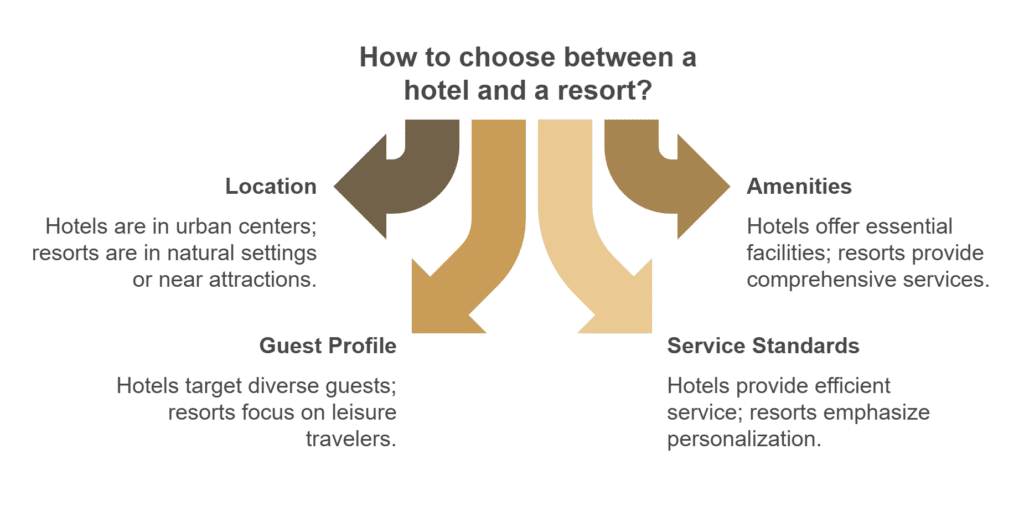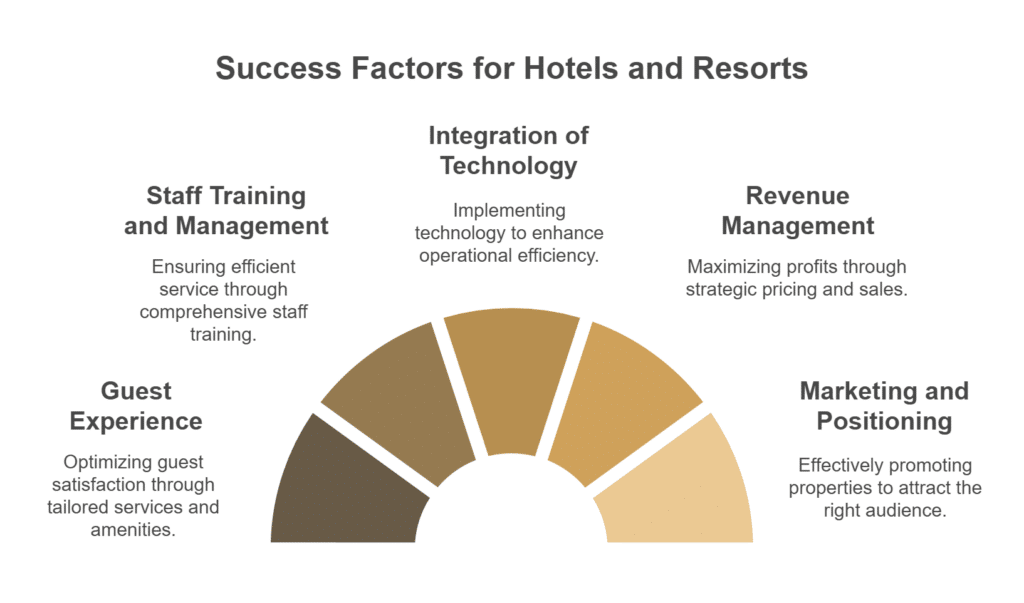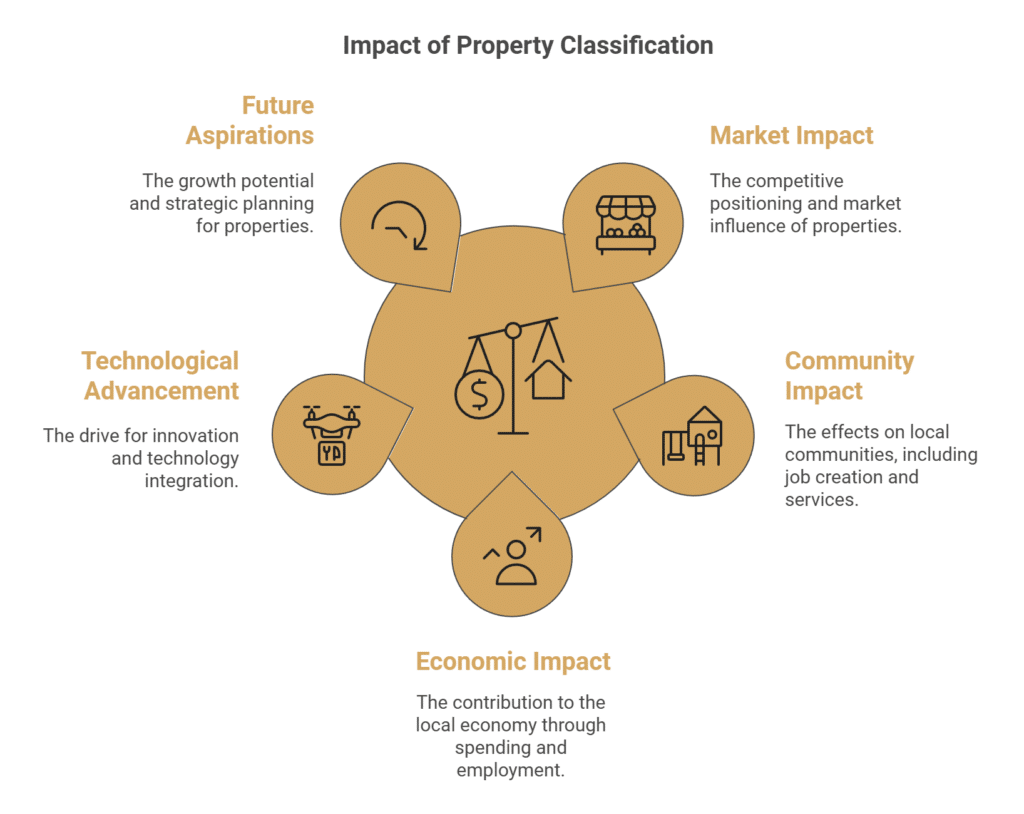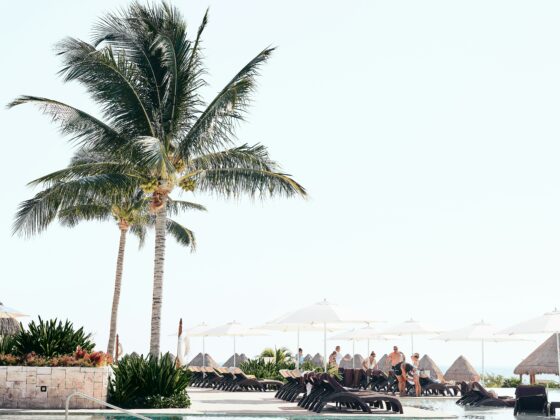To understand the difference between a hotel and resort, you need to explore their core functions. Hotels primarily exist to provide accommodation and key amenities, whereas resorts serve as comprehensive travel destinations.
Professionals working in the industry need to understand this difference because it has a major bearing on operations. The distinction influences the guests that will visit, the facilities provided, how the business is advertised, and more.
In this article, you can learn all about the specific differences between hotels and resorts, explore the most essential success factors and discover how these differences impact operations and requirements.
Table of Contents:
Resort and Hotel: What’s the Difference?
The difference between a hotel and a resort can largely be explained by the difference in guest experience on offer. While a hotel aims to provide a place to stay, a resort aims to provide everything guests need, all in one place.
Essentially, resorts try to serve as travel destinations in their own right, whereas hotels facilitate travel to a destination. This means hotels will generally focus on the most essential services and amenities, while resorts go further.
For example, hotels may provide accommodation, a restaurant, gym facilities, a pool, and room service. Resorts may go much further, adding on-site entertainment and multiple shops and places to eat.
Why the Distinction Between a Hotel and Resort Matters
The comparison of hotel and resort businesses is important because they have different approaches, target audiences, and core operations. Understanding the distinction is vital for strategic decision-making.
For those working in the hotel industry, knowing the difference between a hotel and a resort makes it easier to make marketing and pricing decisions. After all, they appeal to different types of guests.
The type of business also determines the types of facilities and amenities customers expect. This can have a bearing on everything from technology investment and recruitment, to property development and distribution strategies.
6 Key Differences Between Hotels and Resorts
For a comprehensive comparison of hotel and resort businesses, it is important to take a closer look at some of the key differences. In the following sections, you can learn about six hotel vs. resort distinctions:
Video: What Is the Difference between a Hotel and Resort
1. Choice of Location
Your choice of location can be a major difference between a hotel and a resort. Hotels are often located in urban centers or near major transport hubs, whereas resorts are sometimes in natural settings, or connected to tourist attractions.
With both types of accommodation, the location is an important decision. Resorts need to have sufficient space to provide all of the essential services on-site, while hotels generally prioritize convenience and accessibility.
Hotels can be much smaller than resorts, which provides more options when choosing an ideal location. However, as resorts are often located away from major urban areas, it can be easier to get planning permission.
2. Amenities and Facilities
The range of amenities and facilities is arguably the single biggest difference between a hotel and a resort. A hotel will offer shelter, comfort features, and essential facilities, whereas resorts are much more comprehensive.
Understanding this difference is essential for optimizing the guest experience and business operations. Those in resort or hotel management need to know the underlying expectations associated with each property type.
Hotels will generally focus on the most practical facilities and amenities – a gym, a pool, a restaurant, and a spa. Resorts will often offer multiple restaurants, multiple entertainment options, shops, spas and much more.
3. Guest Profile and Target Market
Hotels primarily target tourists, business travelers, and others seeking accommodation to facilitate travel to an area. Resorts primarily target leisure travelers who want comprehensive on-site services.
It is important to get to grips with the difference between a hotel and a resort in terms of audience. Resorts appeal to people who want to spend most of their time on-site, and they are often willing to spend more for this.
By contrast, hotels can vary from budget hotels, to luxury options. They appeal to a wide spectrum of guest types, but many of these guests will want to spend a lot of their time outside of the hotel, in the local area.
4. Service Standards
Another key hotel vs. resort comparison is based on service standards. In general, hotels aim to provide fast and efficient service, while resorts place an extra emphasis on personalization and going the extra mile.
Knowing this difference between a hotel and a resort is important for everything from setting guest expectations to delivering staff training. Essentially, resorts aim to go further, in order to create memorable moments.
The difference in service standards is generalized because some hotels do place a strong emphasis on personalization, too. However, resorts are aiming to serve as a full travel destination, so often invest more heavily in service.
5. Daily Operations
Daily operations is another major point of difference between a hotel and a resort. While hotels are predominantly focused on providing rooms and related services, resorts will often have a large number of major revenue streams.
This highlights an important difference in priority. Hotels generally focus on concepts like room cleanliness and efficient service, but resorts need to consider the quality of entertainment, shops and other offerings too.
Both accommodation types require systems and procedures for success. Again, the scope of resort procedures is usually wider than the scope of hotel procedures, due to the additional facilities.
6. Financial Structure
Hotels often live and die based on the amount of money they make from selling rooms. By contrast, resorts typically have a far wider range of revenue sources, making the financial structure more complex.
Understanding this difference between a hotel and a resort is vital for optimizing revenue management. Resorts typically have a more diverse range of money-generating operations to factor into a strategy.
In some cases, resorts may actually earn more revenue from shops and entertainment venues used by guests than they do from selling rooms. This can make room rates less important than with hotels, but makes occupancy more crucial.

6 Major Success Factors for Hotels and Resorts
In the following sections, you can read about major success factors for hotels and resorts. You can also learn how your property’s classification can make alter the way success is achieved.
Video: Differences of Resort and Hotel
1. The Guest Experience
Hotels and resorts need to optimize the guest experience to achieve success. For hotels, this usually means catering to reasonably basic accommodation needs, but for resorts, a more diverse range of needs need to be considered.
The guest experience is important because it determines whether customers enjoy their stay. The difference between a hotel and a resort means guests have different expectations, which influences their perception of the experience.
Extra facilities and amenities in a hotel are sometimes regarded as a bonus, with the room being the most important element. In resorts, guests expect a more complete visitor experience and see extra facilities as a key part of this.
2. Staff Training and Management
The quality of staff training and management can make or break a hotel or a resort. However, the difference between a hotel and a resort makes a huge difference to the training activities required.
It is important for staff to have the required knowledge for the type of accommodation they work in. While some staff may need a broader range of knowledge in a resort, hotel staff must be trained to deliver efficiency and consistency.
Staff management is also important for those in charge of any accommodation in tourism. Resorts will typically need to recruit, train and manage a wider range of employees, due to the higher number of services provided.
3. Integration of Technology
The difference between a hotel and a resort impacts technology priorities, too. While the broad technology requirements are similar, the most essential investments for each property type can be quite different.
For instance, hotels may prioritize frictionless check-in systems and technology that helps corporate travelers to work. Resorts may focus on technology to manage the vast number of different service areas they cover.
The differences in property type may also influence guest mobile apps, property management systems, and more.
4. Revenue Management
Revenue management is the process of optimizing pricing and key metrics like occupancy, with the intention of maximizing financial results. It is often about selling the right product to the right person for the right price.
The underlying difference between a hotel and a resort has a direct impact on how you should approach revenue management. After all, hotels are more reliant on earnings from rooms than resorts, which have more revenue streams.
For hotels, revenue management is often much more about setting the right room rates. For resorts, pricing needs to be optimized across the board, including in the various on-site shops and restaurants.
5. Marketing and Positioning
Hotels and resorts have different considerations around marketing. Hotels generally aim their efforts at people who need a place to stay, while resorts are targeting travelers who want their accommodation to double as a destination.
This difference between a hotel and resort is important because it impacts how the property is promoted. Hotels often position themselves as a facilitator of travel, while resorts try to generate a desire to travel.
Some hotels are prestigious enough to attract travelers on their own and some resorts facilitate travel to a major tourist destination, so this is not always a firm rule. However, it does generally hold true.
6. Sustainability and Future Growth
Sustainability practices are actions that look out for the long-term future of the planet. However, the precise nature of sustainability measures can vary due to the differences between hotels and resorts.
With hotels, especially in urban areas, consideration needs to be given to the local community and how a busy hotel may impact them. In resorts, especially in natural areas, wildlife conservation is an issue to think about.
Both hotels and resorts need to consider issues like energy usage, resource consumption and their carbon footprint. They also both need to think about future growth potential and how growth may impact their environmental goals.

5 Impact Areas Affected By Property Classification
The difference between a hotel and a resort influences the impact your property can have in a number of ways. In the following sections, you can explore five of the most notable impact areas affected by property classification.
1. Market Impact and Competition
Your property classification can make a big difference to the impact your business has on the market. It can also help to illuminate who you are in competition with and how you should compete with them.
Competition is one of the most essential considerations for any business. You need to know who your rivals are, what they have to offer and how you can differentiate your business from theirs.
Resorts often differentiate through providing a more complete and comprehensive guest experience than rivals. Hotels often differentiate through design features, unique hotel characteristics and by concepts like pricing.
2. Impact on People and Communities
The opening and development of hotels and resorts can impact people in many different ways. They provide jobs, attract visitors, offer important services that people use and they can transform communities.
The difference between a hotel and a resort means the business types can impact people in varying ways. Resorts provide a wider range of jobs, for instance, while hotels are less likely to completely transform a location.
Some of the potential outcomes for people can also be negative, so hotels and resorts need to take steps to reduce harm.
3. Impact on the Local Economy
In addition to impacting people, hotels and resorts can impact the local economy. Not only do these properties provide work, they attract people to the area and these people spend money in local businesses.
The positive impact on the economy of the local area is important for getting community support. Hotels and resorts can cause disruption, so the economic benefits provide a valuable counterbalance.
There can be a significant difference between a hotel and a resort’s impact on the economy. Resorts offer more services, which makes their guests less likely to travel away from the property and visit nearby restaurants and attractions.
4. Technological Advancement
Hotels and resorts are huge businesses, which help to generate technological advancement. For example, the travel industry has had a major impact on virtual reality, translation software and payment systems.
The importance of hotels and resorts for the economy make this influence on technology possible. Software developers, hardware manufacturers and innovators look for where demand exists and where money can be made.
The difference between a hotel and a resort also means technological developments can branch off. For instance, there are property management systems that target hotels and others with features that are only relevant to resorts.
5. Impact on Future Aspirations
The classification of your property will be one of the biggest factors when thinking about your future business aspirations. The possibilities for growth and development depend on what your business actually is.
The difference between a hotel and a resort means growth potential is on an entirely different scale. Hotels can expand and add new features and facilities, but resorts usually have far greater scope to increase in size.
In general, hotels are also more likely to be constrained by their surroundings. Expansion is especially difficult for hotels in built-up areas, like major towns and cities, where planning permission is difficult to acquire.

Comparative Analysis: Hotels vs. Resorts
Here’s a detailed comparison of key aspects that distinguish hotels from resorts:
| Aspect | Hotels | Resorts | Mixed-Use Properties |
| Primary Purpose | Accommodation | Complete Vacation Experience | Hybrid Experience |
| Location | Urban/Business Districts | Destination Areas | Various |
| Average Stay Duration | 1-3 nights | 4-14 nights | 2-7 nights |
| Key Revenue Sources | Room Sales | Multiple Venues | Combined |
| Target Market | Business/Transit | Leisure/Vacation | Mixed |
| Service Level | Efficient/Professional | High-Touch/Personal | Flexible |
| Facility Focus | Essential Amenities | Comprehensive Recreation | Selected Mix |
| Pricing Strategy | Per Night | Package-Based | Combined |
Essential Considerations for Hospitality Management
The following are some of the most important considerations for hotels and resorts:
- Market Analysis: By understanding the difference between a hotel and a resort, you can better understand your place in the market and what you need to do to position your business for maximum success.
- Operational Requirements: The complexities of a resort make operations more varied. Hotels need to consider how to optimize a more limited range of operations to still deliver a great experience.
- Revenue Management: Pricing strategies are directly impacted by the difference between a hotel and a resort. Hotels have fewer revenue streams and rely more heavily on setting the right room rates.
- Service Delivery: Hotels are usually more streamlined in their approach to customer service, whereas resorts try to go the extra mile and may feel pressure to create truly memorable interactions.
- Facility Management: The difference between a hotel and a resort when it comes to scale means both have unique facility management challenges, including issues related to compliance and maintenance.
- Marketing Strategies: A hotel will typically try to target guests who already want to visit a location. Resorts want to be a destination in their own right, so may need to spark the initial travel demand through marketing.
Understanding the Different Types of Hotels
The difference between a hotel and a resort is the tip of the iceberg when it comes to exploring variations within the hotel industry. Each different type of hotel or accommodation business has its own unique requirements, target audience, challenges to overcome, and overall position within the marketplace.
In the “Types of Hotels: Exploring Classifications and Hotel Types” article, you can learn about full-service hotels, boutique hotels, inns, lodges, motels, resorts, hostels and everything in-between.
Exploring the Features of All-Inclusive Resorts
Resorts come in many different forms, but one of the ways they are categorized is by their approach to food, drinks and other essential services. Given the fundamental difference between a hotel and a resort – with resorts positioning themselves as complete travel destinations, it is no surprise that all-inclusive resorts are popular.
In the “All-Inclusive Resorts: Successful & Effective Marketing Strategies” article, you can explore what all-inclusive resorts offer, what their key characteristics are and the target audience for these properties.
Did You Like This Article about the Difference Between a Hotel and Resort?
You might also be interested in the following articles:
The primary difference between a hotel and a resort is their positioning within the market, as hotels aim to facilitate travel to a destination, whereas resorts try to become the destination. This difference influences strategic decisions, technology and staffing needs, the guest experience and how revenue is generated.
More Tips to Grow Your Business
Revfine.com is a knowledge platform for the hospitality & travel industry. Professionals use our insights, strategies and actionable tips to get inspired, optimise revenue, innovate processes and improve customer experience. You can find all hotel & hospitality tips in the categories Revenue Management, Marketing & Distribution, Hotel Operations, Staffing & Career, Technology and Software.
This article is written by:
Hi, I am Martijn Barten, founder of Revfine.com. With 20 years of experience in the hospitality industry, I specialize in optimizing revenue by combining revenue management with marketing strategies. I have successfully developed, implemented, and managed revenue management and marketing strategies for individual properties and multi-property portfolios.









